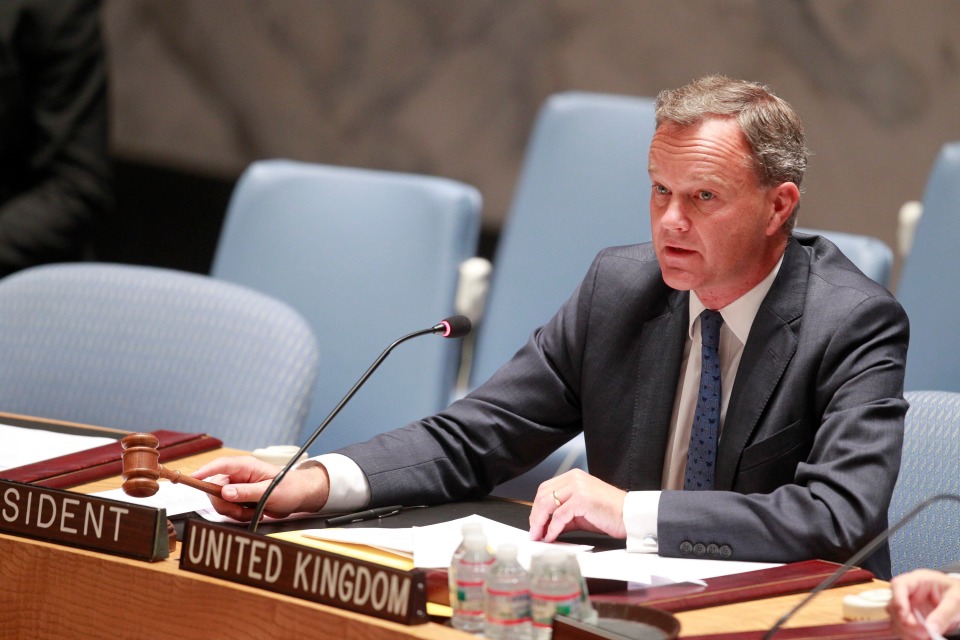"The DRC Government, the wider region, MONUSCO have huge responsibilities for progress upon their shoulders"
Statement by UK Parliamentary Under Secretary of State Mark Simmonds, to the UN Security Council Debate on MONUSCO

I will now make a statement in my national capacity.
It is a huge honour to chair a Security Council meeting at a time where we have a unique opportunity to bring peace and stability to the lives of so many. I’m grateful to the Special Representative and Special Envoy for their words to the Council this morning. If I may I’d like to pay particular tribute to Mary Robinson for her determined and dedicated pursuit of peace in the Great Lakes region. We are fortunate that we have such an excellent replacement in Said Djinnit. I thank Martin Kobler for his tireless work to implement MONUSCO’s mandate and I endorse his words on the killings at Mutarule. The protection of civilians is central to MONUSCO’s work and it is vital that UN peacekeepers fulfil this responsibility.
Members of the Security Council, Foreign Ministers, Special Envoys, we have all often said that there currently exists a rare opportunity to break the cycle of violence in the Democratic Republic of Congo and the region. But it is worth reminding ourselves why that moment of opportunity exists.
In February 2013 in Addis Ababa, when the PSCF was signed, few imagined the progress we see today.
Progress against armed groups where over 4,000 individuals have come forward for disarmament, demobilisation and reintegration.
Progress by the DRC government towards implementing its commitments under the PSCF, including a National Dialogue to build broader engagement.
Progress on preventing sexual violence in conflict, with implementation of the DRC’s national action plan led by the President’s Personal Representative.
This progress has been led by the region. And I want to be clear and emphasise the importance I attach to the region leading this work. And also my gratitude for the progress that has been delivered thanks to the region.
Today, because of the progress made so far and the moment of opportunity we now have, we can imagine a position in two years time where:
all armed groups, including the FDLR, are no longer a threat and there is an end to impunity;
completion of the electoral cycle in accordance with the constitution in DRC is achieved;
where MONUSCO’s drawdown is a realistic proposition, with the Congolese security forces taking an ever greater responsibility for the country’s security.
But to seize this opportunity with the determination and vigour it deserves, and to make progress at the speed it deserves, what we need to achieve by the end of the year is clear:
Full and swift implementation of the Kampala Dialogue Declarations, particularly the status of repatriation of former M23 combatants.
Full and swift disarmament of the FDLR. As the Secretary-General notes in his report, they continue to pose a significant threat. We have mandated MONUSCO to use unilateral force to neutralise all armed groups. We should be prepared to use it if the disarmament process fails to be swift or credible in the same way that we have used it to secure progress against other armed groups that pose an equal threat to the protection of civilians.
And full and swift implementation of national commitments, including the wider reforms needed in the DRC to consolidate the progress made so far.
We will have lost this opportunity if, in two years time, we cannot look back to further, real and tangible process. Despite the excellent progress achieved, the Secretary General’s report is clear that, that in many instances progress is too slow and extremely fragile.
We must stay strong in pursuit of peace. Three principles should underpin our work for the next two years, so that opportunity becomes reality.
Firstly, support for the government of the Democratic Republic of Congo as they undertake a programme of reform and implement their national commitments.
Secondly, support for the regional led processes as they co-operate across borders.
And thirdly, support for MONUSCO as they continue to transform and become more effective at fulfilling their mandate.
The DRC Government, the wider region, MONUSCO have huge responsibilities for progress upon their shoulders as indeed do all of us members of the Security Council. Through the interventions that will be made during this debate I hope they will know that they have the full support of the Security Council. When the Security Council next reviews progress I hope it will hear how progress has been full and swift.
Thank you